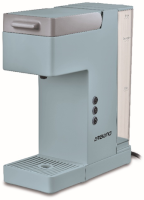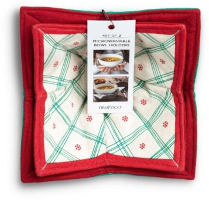
THIS SECTION IS FOR NEWS AND INTERESTING STORIES RELATED TO FOOD, NUTRITION AND FOOD PROCESSING. THEY ARE NOT NECESSARILY RELATED TO KOSHER BUT MAY BE OF INTEREST TO THE KOSHER CONSUMER, MANUFACTURER OR MASHGIACH.

August 15, 2024 from CPSC :
Ambiano Single Serve Coffee Makers have been recalled because the recalled coffee makers can expel hot water from the top of the machine, posing a burn hazard.
Consumer Contact: ALDI toll-free at 888-770-7124 from 8:30 a.m. to 6 p.m. ET Monday through Friday, or online at www.recallrtr.com/aldicoffeemaker or corporate.aldi.us and click on “Newsroom” and then “Product Recalls” for more information.
Description: This recall involves the Ambiano Single Serve Coffee Maker. The coffee maker was sold in gray, blue, pink, and purple colors, and measures approximately L 11", W 4.7" and H 12." Ambiano is printed on the side of the coffee maker. Model numbers and UPC Codes are located on the rating label on the bottom of the unit:
| Product Name | UPC Codes | Model Numbers |
| Ambiano Single Serve Coffee Maker | 4061464174788, 4061464174801, 4061464174849, 4061464174825, 4061464174863 | 708924, 708925 |
Remedy: Consumers should immediately stop using the recalled coffee makers. Consumers may return the unit to an ALDI store for a full cash refund of $49.99, plus applicable sales tax. Alternatively, consumers may receive a $75 ALDI electronic gift card when they visit www.recallrtr.com/aldicoffeemaker, register the recalled coffee maker, and receive instructions on how to cut the unplugged cord, dispose of the product, and upload photos of the coffee maker showing the model number, registration number, and cut cord.
Incidents/Injuries: ALDI has received 25 reports of the recalled coffeemakers expelling hot water from the top of the machine, including three reports of burns.
Sold At: Aldi grocery stores in 38 states and the District of Columbia from July 2023 through September 2023 for about $50.
August 7, 2024 from United With Israel:
"In a shocking display of anti-Semitism, Costa Cruises has exhibited blatant discrimination against Jewish travelers.
"Just days before a planned kosher cruise for 140 Jewish vacationers, Costa Cruises, owned by Carnival Corporation, abruptly canceled the agreement and refused to accommodate any kosher needs on board."
"Yossi Zablocki, a seasoned tour operator, had meticulously arranged every detail for the cruise, including $22,000 worth of kosher products and certified kosher supervisors.
"Despite these preparations, Costa Cruises refused to accommodate any kosher needs on board.
"Zablocki described the refusal for Queens Jewish Link as “outright – and sudden – and without any credible reason,” suggesting that this was not a mere logistical oversight but a clear act of bigotry.
"Further confirming Zablocki’s suspicions, Costa sent a letter two days before the cruise urging Jewish passengers to cancel and later canceled reservations without notice.
"Zablocki’s conclusion was stark: “The absolute, categorical refusal to allow a kosher cruise – or any kosher items – defies any logical explanation.”
"The situation worsened when Costa abruptly ended its business relationship with Zablocki, stating, “We regret to inform you that we will no longer be able to continue our business relationship with your company.”
"This incident is more than a breach of contract; it’s a direct assault on Jewish culture and religious practices.
"Costa Cruises’ actions are a blatant display of anti-Semitism that must not be tolerated.
"A full boycott of Costa Cruises is necessary to demonstrate that such bigotry will not be tolerated."
Ed. note: From Yossi Zablocki:"They cancelled all my kosher cruises even though I had deposits on them for past 10 months."
August 4, 2024 from the FDA Enforcement Report:
Black Forge Knives, Arif Shaheed Road Nizamabad, Nizamabad, Pakistan have been recalled because the products contain elevated levels of lead.
1- Name: Carbon Steel Utility Kitchen Knife Model: CSK1700 Size: Total length: 10.25" Type of packaging: Each knife packed in a single box 2- Name: Carbon Steel Utility Kitchen Cleaver Knife Model: CSK1701 Size: Total length: 10.5" Type of packaging: Each knife packed in a single box 3- Name: Carbon Steel Utility Kitchen Knife Model: 501141 Size: Total length: 9.5" Type of packaging: Each knife packed in a single box 4- Name: Burnt Bone & Carbon Steel Ulu Knife Model: 2432 Size: Total length: 4" Type of packaging: Each knife packed in a single box 5- Name: Rosewood Carbon Steel Ulu Knife Model: 501204 Size: Total length: 4" Type of packaging: Each knife packed in a single box 6- Name: Rosewood Carbon Steel Meat Cleaver Model: 501172 Size: Total length: 10.25" Type of packaging: Each knife packed in a single box Knives sold direct to consumers via Bespoke Post.
Model Numbers: 1- CSK1700 2- CSK1701 3- 501141 4- 2432 5- 501204 6- 501172
August 1, 2024 from the Yeshiva World:
"The IDF’s Home Front Command on Thursday issued a closure order to the Strauss ice cream manufacturing plant in Akko which uses ammonia for its operation.
"Several other factories in the north that use hazardous materials were instructed to empty and dispose of gas reserves to mitigate risk to the public in the event of Hezbollah strikes from Lebanon.
"Ynet reported that the IDF also demanded that Strauss limit the amount of ammonia stored on site as part of emergency regulations for northern Israel. According to the report, ice cream production requires ammonia for cooling production systems and freezers, and ice cream cannot be manufactured without it.
"Strauss workers said an ice cream shortage is not expected if the closure lasts only a few days as it has a sufficient stockpile for the summer.
"The head of the Chatzor HaGlilit Regional Council, Michael Kabesa, urged Home Front Command officers to order the Pri HaGalil food plant to empty its ammonia reserves as well, citing potential risks to residents.
"Beginning on October 8, when Hezbollah began firing rockets, missiles and drones at Israel, factories near the border, such as in Kiryat Shmona, began minimizing the use of ammonia to mitigate public risk."

July 30, 2024 from the Boston Globe:
Ed. note: I am posting exerpts from the article to point out why all beer is not kosher.
"To answer your first question, yes, beer makers use actual oysters when brewing an oyster stout.
"When posed with the follow-up question of how, Joe Mashburn, head brewer at Night Shift, described the process of brewing Night’s Shift’s new Seamark Oyster Stout in further detail.
"'We first wash the oysters,” says Mashburn. “Then we proceed with brewing a stout as normal, with a lot of chocolate malt to get the color and flavor we’re chasing. Then, during the boil, the washed oysters are added directly to the kettle, where the heat causes them to open and release their brine.'
"The oysters, like all other solids, are removed during the brewing process, before the beer is allowed to ferment. In the case of Night Shift's new release, a portion of the beer was aged in a used bourbon barrel; after some time, the two portions of beer were blended back together."
Ed. note: The Kashrut.com Kosher Alcoholic Beverage Information section has links to kosher alcholic beverage lists and beers here



June 2, 2024 from the CPSC in conjunction with Government of Canada:
Frigidaire and Electrolux Side-by-Side, Top Freezer and Multi-door refrigerators have been recalled because the ice level detector arm in the ice maker can break into pieces and fall into the ice bucket, posing a choking hazard.
Consumer Contact: Electrolux toll-free at 833-840-5926 from 8:30 a.m. to 8 p.m. ET Monday through Friday, by email at IceMakerRecall@electrolux.com or online at www.icemakerrecall.com or at www.electrolux.com or www.frigidaire.com and click on “Recalls” at the bottom of the page for more information.
Description: This recall involves 13 models of Frigidaire refrigerators and one Electrolux model refrigerator. The refrigerators all feature an ice maker and come in stainless steel, white and black. The brand name, model and serial number for each unit is printed on a label located on the right panel in the interior of the refrigerator compartment. The refrigerators range from 23 to 36 inches wide.
The model numbers and their serial number ranges in included in this recall are here
Remedy: Consumers should immediately stop using the recalled Frigidaire and Electrolux refrigerator ice makers, empty the ice bucket and contact Electrolux to schedule a technician to replace the ice maker with one that has a polypropylene ice level detector, free of charge.
Sold At: Lowe’s, Home Depot and appliance stores nationwide and online at Frigidaire.com from April 2020 through March 2022 for between $1,200 and $4,300.

February 8, 2024 from the CPSC in conjunction with Government of Canada:
Frigidaire Branded Side by Side Refrigerators with Slim Ice Buckets:
The recalled refrigerators contain an ice bucket assembly component that can break resulting in plastic pieces entering the ice bucket, posing choking and laceration hazards to consumers if the pieces are dispensed out of the ice bucket.
Consumer Contact: Electrolux Group toll-free at 888-377-7563 from 8:30 a.m. to 8 p.m. ET Monday through Friday, by email at IceBucketRecall@electrolux.com or online at www.icebucketrecall.com or at www.frigidaire.com and click on “Recall Information” at the top of the page for more information.
his recall involves certain Frigidaire branded side by side refrigerators with Slim Ice buckets manufactured between 2015 and 2019, with model numbers DGHK2355TF, DGHX2655TF, FFSC2323TS, FGSC2335TD, FGSC2335TF, FGSS2635TD, FGSS2635TE, FGSS2635TF, FGSS2635TP, FPSC2277RF, FPSC2278UF, FPSS2677RF, LFSC2324VF, LGHK2336TD, LGHK2336TF, LGHX2636TD, and LGHX2636TF. Consumers can also visit https://www.frigidaire.com/en/frigidaire-recall-information to see if their specific serial number is included in this recall. The model and serial numbers are printed on a serial plate located inside the refrigerator compartment. More information and Model numbers are here
Remedy: Consumers should immediately stop using the ice makers and contact Electrolux Group to request a replacement ice bucket assembly component, free of charge.
Sold At: Lowe’s, Home Depot and other stores nationwide and online at Frigidaire.com from November 2015 through September 2019 for between $1,400 and $2,400.

June 2, 2024 from CPSC in conjunction with Government of Canada:
Microwavable bowl holders have been recalled because the bowl holder’s fabric can char after being microwaved for the suggested three minutes, posing a fire hazard.
Consumer Contact: Demdaco toll-free at 888-336-3226 from 8 a.m. to 5 p.m. CT Monday through Friday, email customercare@demdaco.com or online at www.demdaco.com/recall-information or www.demdaco.com and click on “Recall Information” at the bottom of the page for more information.
This recall involves Demdaco brand microwavable bowl holders made of cotton and linen fabric. They measure 6.5 inches square for the small bowl holder, 8 inches square for the large bowl holder and were sold in 27 designs. DEMDACO is printed on the tag sewn into the side of the microwavable bowl holder.
Remedy: Consumers should immediately stop using the microwavable bowl holders and contact Demdaco for a full refund. Consumers can return the bowl holder to the place where it was purchased or request free return shipping by contacting Demdaco directly.
Sold At: Gift shops, hardware stores, florists, drug stores and pharmacies nationwide and online at Demdaco.com, Target.com, Amazon.com and Zulily.com from June 2020 through March 2022 for about $23.
July 29, 2024 from Matzav.com:
"Volunteers in Israel have saved agricultural produce valued at $50 million since the start of the war against Hamas in Gaza, even amid major damage to the country’s agricultural sector, according to a study released this week.
"Hundreds of thousands of volunteers from Israel and around the world have helped rescue over 35,000 tons of produce, according to Leket Israel, The National Food Bank, a registered Israel-based charity.
"Nearly one in two Israelis volunteered in the first months of the war, earlier surveys have shown, while both Jewish and Christian volunteers from around the globe came to Israel to help hard-hit farmers harvest their crops.
"The price of fresh produce in Israel still increased by as much as 18% during the first six months of the war, the report found, while fruit prices rose by as much as 12%.
"Nearly a third of Israel’s agricultural land lies in frontline areas, with about 22% in the Gaza border area and 10% on the northern border with Lebanon.
"The study found that increased food waste as a result of the war cost the economy approximately $275 million, including $185 million worth of wasted food.
"More than 20% of produce was wasted as a result of the war, the study found, compared to less than 10% before the war broke out."
July 26, 2024 from the FoodBev Media:
"
"Despite existing legislation, the EU recorded 15 such cases at the beginning of 2018. However, according to data accessed by The Guardian under freedom of information laws, 50 such cases have already been recorded in Q1 of 2024.
"The data includes instances of olive oil found to be adulterated with oils of a cheaper quality and even those unsuitable for human consumption, pesticides and shards of glass.
"Paris, France-based cultivated meat start-up Gourmey has filed 'Europe's first' submission to sell its foie gras product made from cultivated duck cells.
"This EU submission is one of five simultaneously filed worldwide including Singapore, the US, UK and Switzerland. The firm filed applications with the United States Food and Drug Administration (FDA), the Singapore Food Agency (SFA), the Food Standards Agency (FSA) in the UK, the Swiss Federal Food Safety and Veterinary Office (FSVO) and the European Commission (EC) and European Food Safety Authority (EFSA).
"As Gourmey does not use gene-edited or genetically modified cells, its application falls in scope of the novel food regulation. To support the application, the start-up prepared a dossier in accordance with the relevant regulations and EFSA guidance.
"Before a cultivated meat product can be sold in Europe, it needs to be approved by the European Commission. The market authorisation of cultivated meat is governed by the Novel Foods Regulation, which is one of the most robust food safety frameworks in the world.
"Once the European Commission approves a cultivated meat product, it can be sold across all 27 EU countries. The approval process will include a thorough and evidence-based assessment of the safety and nutritional value of cultivated meat and is estimated to take at least 18 months.
"During risk management and the public consultation phase of the process, it also enables the consideration of the potential social, economic and environmental impacts of the food in question. The European Commission and member states have a role in the approvals process alongside scientific experts at the European Food Safety Authority, to ensure authorisation decisions are representative and retain the buy-in of all stakeholders."
July 29, 2024 from the Food Ingredients First:
"The EU has recorded a sharp increase in potential cases of olive oil fraud and mislabeling in the first quarter of this year, attributed to rising prices for key commodities worldwide.
"Extra virgin olive oil prices have skyrocketed to an unprecedented level due to climate change and the burden of high interest rates. The most influential olive markets in the EU — Bari (Italy), Chania (Greece) and Jaén (Spain) — are grappling with historic price surges. At the same time, global production has plummeted from 3.4 metric tons last year to 2.3 metric tons this year.
"Industry experts predicted a scenario where the global demand for the kitchen staple will outweigh supply, in May this year. The crunch has led to increased prices and fraudulent activities, including mislabeling, adulterated olive oil and potential fraud cases.
"The EU has marketing standards to ensure that agricultural products in the market meet standardized and satisfactory quality standards and can deliver on consumer expectations.
"The EU olive oil legislation explicitly lays down the different categories of olive and olive-pomace oils and the relevant analysis methods to be used by member states control authorities. The regulation also defines rules for labeling and packaging olive oil and related products.
"EU law stipulates that EU countries must perform several checks and controls in line with the volume of olive oil marketed in their country. This helps the Commission ensure the region follows marketing standards for olive and olive-pomace oils.
"Despite existing legislation, the EU recorded 15 such cases at the beginning of 2018. However, according to data accessed by The Guardian under freedom of information laws, 50 such cases have already been recorded in Q1 of 2024.
"The data includes instances of olive oil found to be adulterated with oils of a cheaper quality and even those unsuitable for human consumption, pesticides and shards of glass.
"Meanwhile, in Spain — which accounts for more than 40% of the world’s olive oil production — 41 cases of olive oil fraud and non-compliance have been reported since the beginning of 2023.
"Member states take action based on the seriousness of the irregularities detected."
| The information posted is from secondary sources. We cannot take responsibility for the accuracy of the information. |
| Comments to webmaster@kashrut.com
© Copyright 2025 Scharf Associates |
|
|||||||||||